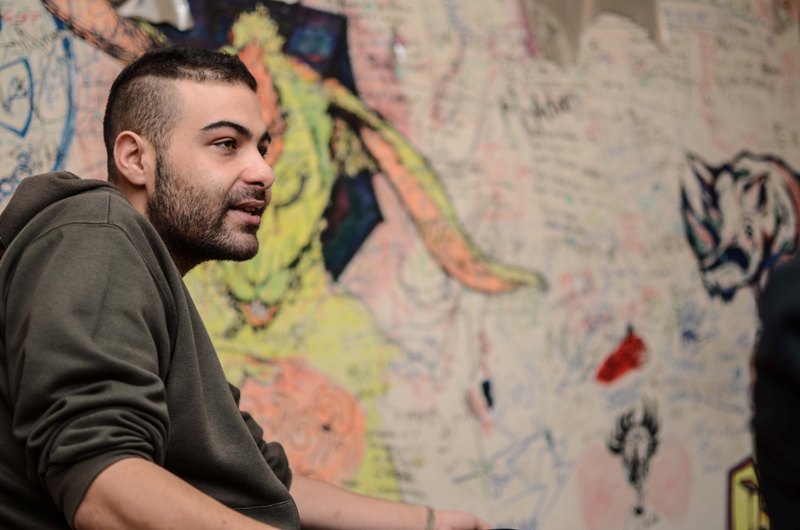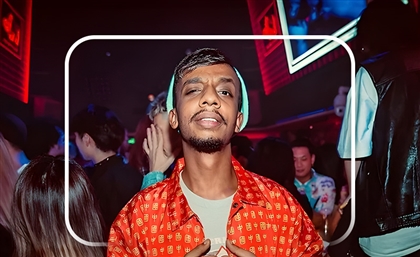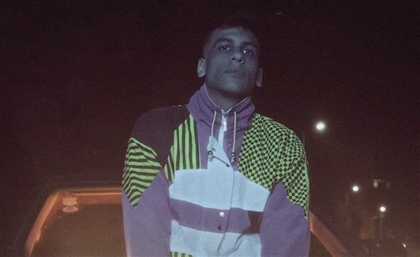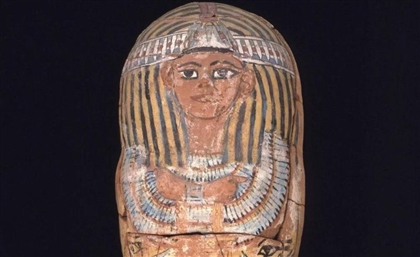Getting Abyusif
Eihab Boraie meets Youssef Altay, better known by his Rap alias, Abyusif, and enters the unique home and mind of one of Egypt's most determined musicians, as well as getting the exclusive first listen of his latest track for CairoScene's readers.

In the back streets of Zamalek, in a graffiti covered room, lives an artist by the name of Youssef Altay aka Abyusif, who walks the fine line between absolute madness and ingeniousness. Pinpointing where he falls in the spectrum can be a little tricky, but one thing that becomes very clear is that he is a very intelligent and calculated rapper/producer who aims to be the “commercial reflection of the underground... neek.”
Entering his room was a surreal experience; it felt like being given an exclusive pass into his brain. All the walls were completely covered in colourful art and thoughts that have accumulated over a decade. His closet, covered in scrawled track titles, is set up as a make shift sound booth, equipped with a mic and a spot for his lap top. Trying to make sense of it all without a guided tour was impossible, but hidden on the walls are clues that give insight into the thoughts that shaped him into the talented rapper he is today. However, the further we investigate his walls, the clearer it becomes that this musicians journey doesn't begin in Hip-Hop, but rooted in Metal.
Altay's passage into music began at a very young age, thanks to his father, who was a professional Jazz drummer. “ In the fourth grade. I was approached by older kids who thought it would be funny to have a kid as a drummer. It broke my dad's heart when I asked him to teach me Twist and Shout by the Beatles,” Altay reminisces. The reason? His father held The Beatles and their mainstream success responsible for the decline of Jazz music at the time. Despite a successful performance and positive feedback, Altay discovered that he hates playing other people's music and set out to make his own.
This ambition, coupled with his desire to play the guitar, lead him into Metal. The only problem was that, at the time, all the Metal bands in Egypt were playing covers, but calling them originals. So Altay set out to write his own songs under the band name Idle Mind. “ My favourite thing to do in this world is play guitar, even more than Rapping....but Metal didn't work out it as it was always like, 15 people and a couple girls who had heard Deftones before,” says Altay, exasperatedly.

His entrance into the Hip-Hop realm came via a long time friend and collaborator Bam Bam. “ Bam Bam introduced me to Rap when I used to play Metal. We started a band called the Overlord of the Brewing Women, and we thought we would be like Rage Against the Machine, but our guitarist was obsessed with Pink Floyd, so it ended up sounding weird... like Jimi Hendrix with a Rapper.” The band eventually dissolved and each member went their separate way but the experience left Altay with a new passion for Hip-Hop. “Metal is contemporary, almost fantasy. It’s all about singing about dragons and daggers. With Rap it is all about the daily life experience and talking truths. I can rap about fucking you up and stealing your girlfriend,” he chuckles. It was around this time that it dawned on Altay that he had been going about making music the wrong way. “Usually I am on the drums or playing guitar, then it occurred to me Why the fuck did I start all these bands and get singers? Why the fuck didn't I sing? Why the fuck didn't I get all the singer pussy?”
Five years later Bam Bam and Altay would reunite, but had each changed direction. Bam Bam bought a guitar, while Altay abandoned his and took on rapping. “Bam Bam taught me flow and Dousha taught me technique and how to use terminology that is exclusively Egyptian rap,” Atlay explains. However, he soon realised that flow and technique weren't enough to make a good Arabic rapper. The missing piece of the puzzle was including punch-lines that connect with Egyptians, their pop culture and their lifestyles. Growing up Altay was very westernised, like many, watching Hollywood films and listening to foreign music. “I wish I could just go back and tell the young me to listen to Egyptian music before listening to Limp Bizkit so that when I grew up, I was aware of the culture, and all of the inside jokes, instead of finding myself having to catch up.”
Incredibly, in a life-imitating-art moment, everything we talked about up until this point can be traced back to the illustrations and thoughts plastered on Altay’s walls. With his back-story explained and the transformation into Abyusif complete, it was now time to talk about the state of Hip-Hop in Egypt.

Despite the global domination of Hip-Hop, now considered a mainstream genre and, in fact a lifestyle, in Egypt, it’s still considered to be underground because of the lack venues and platforms to launch artists and tracks off of. Unless you are a rapper that is exploiting the political situation and gaining fame off the back of the revolution, then you won't be heard. However, Abyusif will never be found rapping about politics. In fact, he explains passionately that it goes against his fundamental principles. When creating rhymes, the rapper has four self-imposed rules that he follows:
1. He won't rap about anything that could be considered derogatory towards women. Instead, he prefers to paint women as players and not as, for lack of a better word – we are talking about Hip-Hop after all, sluts.
2. He refuses to talk politics, believing that political opinions constantly change, making songs irrelevant whenever it does. He also doesn't believe in profiting from the revolution, whether in terms of money or in terms of fame, and dislikes artist that do. (However, he does admit that these same artists helped bring new ears to Hip-Hop that they, in turn, could convert to Abyusif fans.)
3. He refuses to rap about religion, believing that religion is a personal relationship between each person and God. This relationship is private and talking about it is polarising and futile.
4. He tries not to diss other rappers, and if he does, he makes sure that he speaks for himself and no one else.
If you follow his rules, then Abyusif is ready and willing to collaborate and, accordingly, his SoundCloud is filled with collaborations. In an ego driven genre, I found Abyusif to be honest, humble, productive, and very sincere. On more than one occasion during the interview, Abyusif's mind would run wild, getting sidetracked and insisting on playing me tracks of other rappers on the scene, opening my ears to the wide pool of talent that exists in Egypt. It was very enlightening having a guide clearly distinguish sounds, explaining that “every area in Egypt has its own style of Hip-Hop.” At one point he introduced rappers who were dissing him and his family on their tracks, and astonishingly he knew all the words and was rapping along. “I am a fan of all Rap music. If you rap I am fan of you. Even the Arabian Knights, who I once had beef with over them dissing Bam Bam. I recognise I wouldn't be here without their efforts.”
When talking about Arabic Hip-Hop there is always an elephant in the room that goes by the name of Shaabi. Arab rappers absolute loathe Shaabi music, which is seems absurd, considering that Shaabi and Rap music are branches of the same tree. “Shaabi is the real Hip-Hop of Egypt, because it blossomed organically. The underground Rap scene hates them even though it is a bridge. This hate is basically classicism,” explains Abyusif. It isn't often you meet a rapper who has anything good to say about Shaabi music, let alone admit that he loves “Amr Diab, and I can appreciate Tamer Hosny's hustle. I want that kind of exposure.”

Listening to Abyusif’s plethora of tracks, you can’t help but think that he deserves that kind of exposure indeed. He has created over 200 tracks, 49 of which are currently available on his SoundCloud and believes that “Hip Hop strengthened my work ethic” adding that “Work is something that you should respect no matter what the fuck you do. You have to respect it.”
His beats have depth, are highly addictive, and sometimes have tasty Arabic samples buried within them. His rhymes are well thought out and his flow continuously rolls effortlessly. His style varies and, at times, reminds me of Odd Future Wolf Gang Kill Them All. It is hard to describe his evolution as a rapper, as he often releases tracks as soon as he creates them, not bothering with putting together albums, although that will be changing very soon. I couldn’t tell you if he has gotten better or worse with time, but I can assure you he is extremely talented and worth the listen.
Most of his songs are in Arabic and though he can rap in English, he prefers not to. “I have a few verses but I have a personal problem with rapping in English. I can't find a dialect or accent that is sincere. It ends up sounding like I am trying to copy someone else,” he explains. Abyusif clearly loves his craft, always researching the latest sounds and showing no signs of quitting. With what I gained in sitting down with this eccentric musician over two hours, I feel confidence and excitement that good Hip-Hop is flourishing in Cairo, and sooner or later it will replace the barren, boring House desert sound-scape, with a vibrant and colourful jungle of original urban poets. When this happens, I wouldn't be surprised to find Abyusif at the top of the food chain.
SceneNoise Exclusive: We get the first listen to the first track off Abyusif's upcoming album, entitled Combo Mish Sandwetch:
Photos by Ahmed Hassanien.
- Previous Article House of Sebzz XIV
- Next Article Iran Footie Girls Face Sex Test
Trending This Week
-
May 01, 2024
























